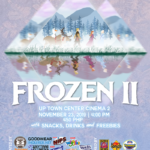In recent years, a group of mostly female poets have dominated the sales of poetry books around the world. Dubbed as “Insta-poets,” they started by posting their works on social media sites such as Instagram, Tumblr, and Twitter before being noticed by publishing houses.
In Canada, there’s Rupi Kaur, whose book “Milk and Honey” outsold by millions all poetry books worldwide in 2016; from the U.K. comes Hollie McNish, whose videos of spoken-word performances have thousands of followers on YouTube; and lastly from New Zealand comes Lang Leav, whose love poems are immensely popular on Twitter. Among them, Leav is the most famous in the Philippines, counting millions of Filipino adolescents and showbiz celebrities as her fans.
Leav visited the country early this year to promote her latest book, “Love Looks Good on You.” Afterwards, ANCX, the online news site, published a scathing piece on her, calling into question the artistic merits of her work. It prompted a debate between fans and critics of the Thai-born writer: Does Lang Leav write good or bad poetry?
‘Close Reading’ a Poem
In literary criticism, Formalism refers to a mode of inquiry that aims to analyze a literary work based “on the features of the text itself, to the exclusion of biographical, historical, or intellectual contexts.” [New World Encyclopedia, 2019] In the 1940s, two styles of criticism emerged from it: Russian Formalism (for Russian poetry) and New Criticism (Anglo-American poetry).
New Criticism is widely considered as the most influential framework in teaching literary criticism in the academe, particularly in poetry. According to the Poetry Foundation, “The New Critics emphasized ‘close reading’ as a way to engage with a text, and paid close attention to the interactions between form and meaning.” Close reading, as a fundamental tool of literary criticism, “places great emphasis on the particular over the general, paying close attention to individual words, syntax, even punctuation, and the order in which sentences and images unfold as they are read.” [New World Encyclopedia, 2019]
In this sense, everything that a poem wants to say is in the poem itself; no other factors should influence the reading of it. Only the writing matters. Therefore, in a poem, a flower is a flower, bread is bread, water is water. We can’t assume that they are symbols or representations of anything in the outside world.
To apply close reading, here’s one of Leav’s most famous poems:
Almost
by Lang Leav
Do you see
how I love him true –
it could have been you.
As for you
and your love for she –
it could have been me.
But we were a maybe,
and never a must –
when it should have been us.
The speaker in the poem is a woman relating a love affair that never came to fruition. It’s a conversational poem that uses a rhyming pattern: in each stanza, the second and third lines have a definite rhyme at the end. The poem doesn’t have a setting or imagery (figures of speech such as metaphors or similes).
In the first and second stanza, the woman hints at the irony of their situation. She asks, “do you see/how I love him true,” and then adds, “it could have been you.” Notice the use of “she” instead of the possessive “her” in the second stanza, meant to make the last word – “me” – rhyme with it.
The third stanza underscores the overarching idea: “We were a maybe,/and never a must – when it should have been us.” The speaker in the poem says they should have been in each other’s company, and not with their current partners.
The poem tells the paradoxical nature of their respective love affairs. It can’t be said that the woman blames the man for it, nor herself. She simply tells the story. Perhaps, more explanation is needed to reinforce the speaker’s verdict here – “it should have been us” – to support this truth claim. As readers, we can’t completely agree with it, since the story lacks sufficient background, a context in which to frame it.
Here’s another poem by Leav in the same vein, talking about friends that never became lovers:
Just Friends
by Lang Leav
I know that I don’t own you,
and perhaps I never will,
so my anger when you’re with her,
I have no right to feel.
I know that you don’t own me,
and I should ask for more:
I shouldn’t feel so let down,
all the times you don’t call.
What I feel – I shouldn’t show you,
so when you’re around I won’t;
I know I’ve no right to feel it –
but it doesn’t mean I don’t.
Again, Leav uses a rhyming pattern in the poem, lending the lines with a flowing cadence. Leav is a fan of Robert Frost and Emily Dickinson, two poets who used meter and rhyme in their works, and their influence is evident in this aspect.
In this poem, the speaker talks about a girl’s frustrations at not being loved. She feels anger (jealousy) when she sees him with another girl, but knows “I have no right to feel it.” She feels miserable when the boy doesn’t call, but doesn’t talk to him about it. She bears the pain of loving a friend who doesn’t reciprocate the love she needs.
Curiously, we don’t find any imagery in this poem, too. The speaking voice relates a story, unburdening her emotions to the reader.
Applause and Criticism
Defending Leav’s poetry, many of her fans say her work captures the zeitgeist, or the prevailing mood and culture of our times, a time when terms such as “friendzone,” “ghosting” or “hugot” are easily understood by younger generations. In her poems, Leav mostly talks about unfulfilled adolescent love, the first blooming of desire, tales of young broken hearts.
There’s a striking quality in Leav’s poems here: You don’t read them and find Leav’s own voice, hear her life stories or any autobiographical references that poets sometimes use to present a worldview. She adapts a persona that focuses on the young readers’ (mostly female) experiences.
On the other side of the spectrum, critics describe her work as too accessible and melodramatic – shallow, amateurish verses that focus on emotion instead of plumbing the depths of human experience. But are these charges truly accurate? Shouldn’t poetry be understood, accessible to readers? What’s wrong with the poetic practice of Leav and her contemporaries, this penchant for dwelling on emotion?
To understand these concerns, we can look back to tradition and history, to the works of great poets. In 1919, T.S. Eliot – English poet, one of the main proponents of New Criticism, and later recipient of the Nobel Prize for Literature – wrote a landmark essay titled “Tradition and the Individual Talent.” In it, Eliot famously stated: “Poetry is not a turning loose of emotion, but an escape from emotion.”
Eliot argued that a poet’s obligation is not to pour out emotion, but to transcend it. He believed that the power of poetry lies in its capacity for introspective, sober analysis of the natural world, instead of grand declarations or bombastic pronouncements about it. Poetry, in this respect, calls for a careful and rigorous selection of words and images, the idea that writing is a tool for the imagination, a place of discovery – but firmly grounded by restraint, by reason.
As Eliot wrote, “There are many people who appreciate the expression of emotion in verse, and there is a smaller number of people who can appreciate technical excellence. But very few know there is expression of significant emotion, emotion which has its life in the poem and not in the history of the poet. The emotion of art is impersonal.”
Objective Correlative
The notion of impersonality in poetic expression stems from a concept called “objective correlative.” In one of his essays, Eliot described the term as “a set of objects, a situation, a chain of events which shall be the formula of that particular emotion.” A poet reaches for affect (the opposite of effect) in writing, evoking emotions through objects, images or situations, rather than merely describing feelings per se. Here’s a short poem that uses objective correlative:
In A Station of the Metro
by Ezra Pound
The apparition of these faces in the crowd:
Petals on a wet, black bough.
In this poem, Pound relates his experience of watching people at a train station. He likens their faces to petals sticking to a wet tree trunk. By using the image, he describes the rush of people walking past each other in a crowded station, lending their profiles as a blurry haze to a casual observer, like an apparition. The word “petal” evokes a sense of delicateness, an unexpected sense of beauty contrasting against night’s blackness.
Here’s a poem that uses objective correlative through a series of encounters:
Love After Love
by Derek Walcott
The time will come
when, with elation,
you will greet yourself arriving
at your own door, in your own mirror
and each will smile at the other’s welcome,
and say, Sit here. Eat.
You will love again the stranger who was your self.
Give wine. Give bread. Give back your heart
to itself, to the stranger who has loved you
all your life, whom you ignored
for another, who knows you by heart.
Take down the love letters from the bookshelf,
the photographs, the desperate notes,
peel your own image from the mirror.
Sit. Feast on your life.
The poem is an instruction on how to heal after the end of a romantic relationship. Walcott uses the idea of the self as a stranger. He describes how one day, after losing love, a person will find joy at meeting oneself, like an old friend. He instructs by offering wine and bread to it, providing sustenance to give it strength, vitality. He reminds us to give back our hearts to ourselves, to love this “stranger” again.
It’s worth noting that the image of “the-stranger-as-the-self” is familiar to us because we feel disconnected to ourselves after a break-up; we feel devastated, directionless, broken, torn by grief. The sequence of lines starting from “Take down the love letters from the bookshelf” works in the literal sense: Walcott wants us to really go to the bookshelf, read the love letters, peruse the photographs and desperate notes. In the end, he maintains that after a great loss, we should remember to pause and collect our thoughts, to reflect on the possibility of beauty, despite tragedy.
Ars Poetica (The Art of Poetry)
But what is poetry?
Fortunately, we don’t know exactly what poetry is. No single, absolute definition will capture it with finality. We can only describe how it works, its processes, its movement. We might have better success at defining air, fire, or other elements than it.
But poetry is an art, and thus shouldn’t be relegated only to the realm of the philosophical. It’s primarily a craft, a rigorous discipline. Thus, it’s rare to find a serious poet endowed with enormous poetic energy who didn’t start out as an apprentice of an older, much experienced poet.
Going back to Leav, the jubilant response of young Filipino fans to her work might be central to the discussion of poetry’s place in the 21st century. The popular sentiment that her poetry accelerates the dumbing down of readers in the “Instagram age,” this technological age of short attention span and relentless self-promotion, misses the point. For one, it would be truly unfair and myopic to attack Leav as an enemy of the very art she strives to create. Also, I’m suspicious of any rules on what’s supposed to be read in our bookstores – they would probably do more harm than good. Perhaps, true passion doesn’t divide, but unites.
Let me leave with the words of Adam Zagajewski, a Polish poet, speaking about the need for poetry, and how it responds to our inner life:
“Contemporary mass culture, entertaining and at times harmless as it may be, is marked by its complete ignorance of the inner life. Not only can it not create this life; it drains it, corrodes it, undermines it. Science, caught up in other problems, likewise neglects it. Thus only a few artists, philosophers, and theologians are left to defend this fragile, besieged fortress.
“Defending the spiritual life is not merely a sop thrown to the radical aesthetes. I see the spiritual life, the inner voice that speaks to us, or perhaps only in whispers, in Polish, English, Russian, or Greek, as the mainstay and foundation of our freedom, the indispensable territory of reflection and independence shielding us from the mighty blows and temptations of modern life.”
Written by J.P. Dalangin for POP!
POP!/VT



